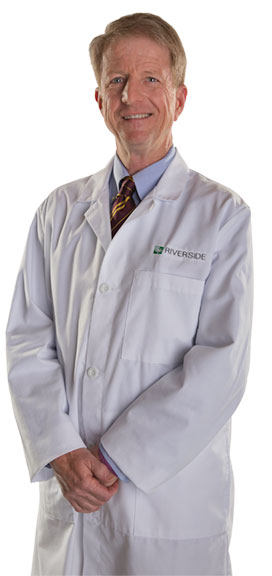Riverside Medical Group
 Unlike most physicians, who have a say in their chosen profession, Dr. David Maxwell believes his career was determined very early. “I learned about it much later,” he says, “but apparently my grandmother wished that I would become a doctor before I was born.” He remembers yearly gifts from his grandmother always included doctor kits; thus, “I soon became disillusioned of the concept of free will.”
Unlike most physicians, who have a say in their chosen profession, Dr. David Maxwell believes his career was determined very early. “I learned about it much later,” he says, “but apparently my grandmother wished that I would become a doctor before I was born.” He remembers yearly gifts from his grandmother always included doctor kits; thus, “I soon became disillusioned of the concept of free will.”
Although his father would have preferred accounting, grandmotherly persuasion won out: with a natural bent toward science, David Maxwell graduated with a degree in biology from the University of Virginia, and thereafter earned his medical degree at Eastern Virginia Medical School. “I wanted to become a family doc,” he says. “My dream was to work with Dr. Rives Bailey in Yorktown, where I’d lived since the 8th grade.” But at EVMS, he met Dr. Stuart Baker, who changed his mind. “He was a rheumatologist, and the smartest doctor I’d ever met,” Dr. Maxwell says. “He made rheumatology, a very complex specialty, sound understandable, and doable.” And, he adds, “Dr. Baker was a disciple of William Osler. Now I am as well.”
Dr. Maxwell remained at EVMS for his internal medicine internship, residency and chief residency under Dr. Hershel Estep (another hero), then to the Medical University of South Carolina for his fellowship in rheumatology and immunology. In 1986, he returned to Yorktown and set up his practice. “Providence has given me my wife, Sally Harcum, who put me through medical school,” he says, “and when my fledgling practice floundered, she put the organization together that allowed me to spend the next 25 years doing what I loved: taking care of patients.” In 2013, he joined Riverside Medical Group and established a rheumatology division.
He describes rheumatology as “a Sherlock Holmes sort of specialty.” The diagnoses are frequently obscure, but another mentor once told him that, “If you listen and observe – and are receptive – the patient will tell you the diagnosis. That’s what I learned from Dr. Baker: to be intellectually and psychologically prepared.”
After nearly three decades, Dr. Maxwell has seen many changes in the field of rheumatology. He explains: “Historically, the rheumatologist dealt with medical musculoskeletal issues, areas now managed by orthopedics, physical therapy and physical medicine. In fact, we’re much more akin, as specialists, to the oncologists now.”
Particularly in the case of rheumatoid arthritis, the excellent results achieved by the additional of biologic immunomodulation to disease modifying therapy have meant fewer referrals for orthopedic surgery. “With chemotherapeutic drugs like rituximab, cyclophosphamide and azathioprine, it’s rare that we can’t control rheumatoid arthritis in this day and age.” The frequent limitation, he says, is insurance funding of the treatments, which are vastly expensive.
The biologics cost in the realm of $20,000 to $30,000 a year, retail. “One could control every rheumatoid for $30,000 a year for the rest of their lives,” Dr. Maxwell says, “but the cost may make that an unsustainable goal. Not all insurance companies pay for biologics.” Even those that do often require the patient to shoulder a great deal of the cost. He adds, “In Economics at UVA, they taught us about wartime economics: production of guns or butter; you can’t afford both.”
Dr. Maxwell finds the wartime analogy useful for explaining rheumatic diseases and autoimmune disorders to his patients. “I tell them to imagine an intelligence division and an armored division,” he says. “The intelligence division identifies the enemy, and the armored division does the shooting. When the intelligence division makes a mistake and starts targeting normal tissue as being foreign, that’s autoimmunity. What is targeted determines the patient’s particular disease, whether it be thyroid, pancreas, joints, skin, lung, kidney – or when it’s multiple organs at once, we call that lupus.”
Why it happens in the first place isn’t known, although research continues. “That’s the Nobel prize question,” Dr. Maxwell says.
He’s hopeful that some time in the future, there may be a bigger role for genetic testing in rheumatology. “In research institutions, they can do genetic profiling and find certain genes that predispose to autoimmune diseases,” he explains, “but this information is not clinically helpful at this point: now, you treat what you see. Inheriting a gene doesn’t guarantee that a patient will get the disease. We treat when the disease becomes manifest.”
In the scarce free time his rheumatology practice has afforded him over the last 20 years, Dr. Maxwell has been involved in the family practicing training program at Riverside, where he has an ongoing monthly clinic, and 15 or so years at the Lackey Free Clinic (Dr. Jim Shaw is another hero). An unabashed “big fan of youth,” he has a long history of involvement with the Boy Scouts of America, having served variously as Scoutmaster of Troop 28 in Poquoson, as a Committee Member of the Chesapeake Bay District/Colonial Virginia Council, and as Staff Physician for the XX World Scout Jamboree in Santiago, Chile.
“I love young people,” he says. “And I’ve been blessed throughout my career with really good mentors. Now I’m trying to give back.”

